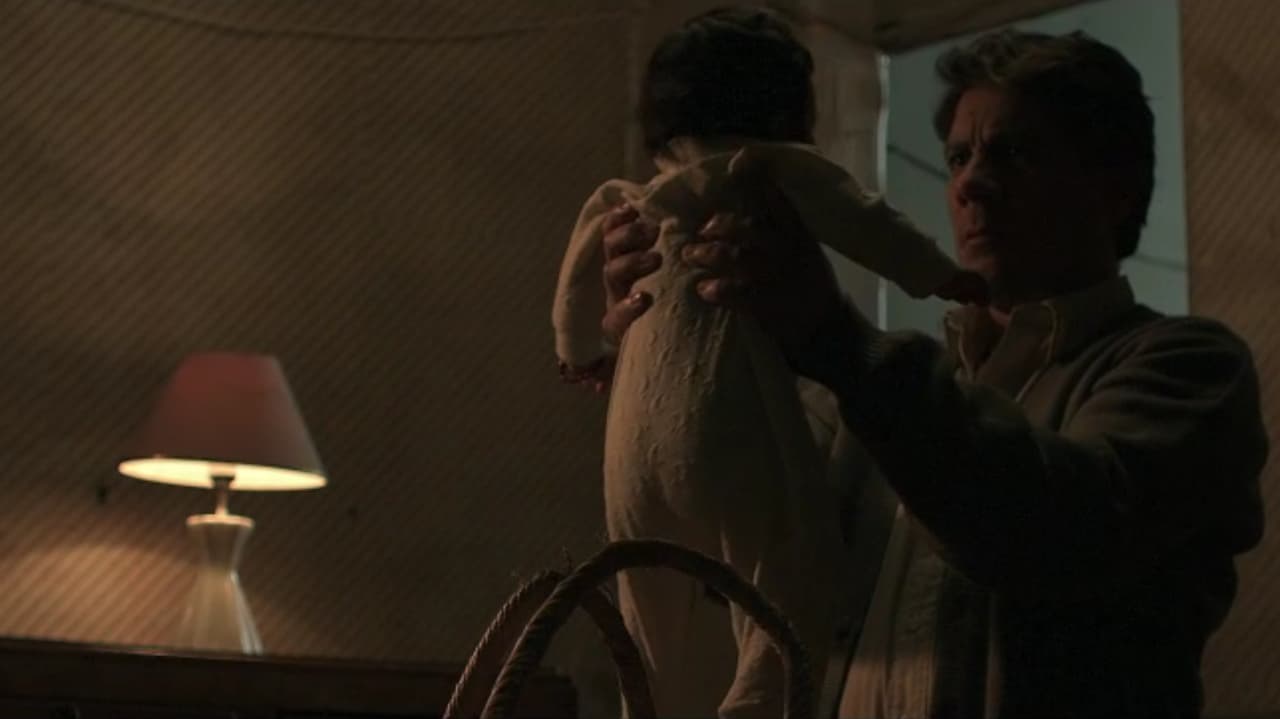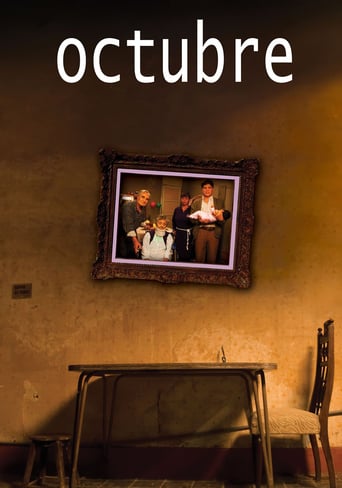



A bit overrated, but still an amazing film
If the ambition is to provide two hours of instantly forgettable, popcorn-munching escapism, it succeeds.
View MoreThe acting is good, and the firecracker script has some excellent ideas.
View MoreBlistering performances.
Clemente is a stoic private moneylender with a penchant for prostitutes. He finds a new born baby but the prostitute mother has walked away. The social worker convinces him to take in the baby. As he tries to find the mother, his neighbor Sofía helps take care of the baby. Sofía is religious devoted to worshiping Our Lord of the Miracles which the city celebrates in October.The characters are played with calculated deliberate distance and stoicism. It makes them hard to connect with. It becomes a grind to wait for the emotions and intensity. The story takes place in the poor part of Lima but it doesn't have that energy. The static feel is an artistic choice which doesn't excite me.
View MoreSo it's my understanding that this film was a Jury Prize winner at Cannes. I would really hate to see the losing entries. Continuing on with the liner notes, the film is described as a 'deadpan dark comedy', but in my estimation, only the term 'dark' describes it adequately. Now there are only two other reviews of the picture on this forum as I write this, and both of them give a fairly positive view of what transpires in the story. I actually found those reviews well done and respectful of the picture, and I don't intend to be negative here, but this one simply did not do it for me. The principal characters were one dimensional and lifeless, and Clemente (Bruno Odar) was about the saddest example of humanity you're likely to see in any film. Squalid conditions permeating every scene throughout the story make it difficult to convince that there's supposed to be some uplifting message to be found. As an illustration, I'm pretty sure I've never seen a guy clip his toenails in a movie before, or get beaten up by a taxi driver because there was something wrong with his intended payment. I'm sure the desired effect of the picture is supposed to be one of Clemente finding his own humanity among the dregs of Peruvian society, but making his way throughout the entire story without even cracking a smile convinced me he was more of a hopeless case than ever. I'm perfectly willing to let others have their positive view of this picture, but for me it would take a Lord of Miracles to convince me to watch it again.
View MoreClemente, a Peruvian money lender, conducts business out of his shabby house in Lima. He is visited mainly by poor people hoping to be lent some badly needed money, which they might not even repay, to get them out of a tough spot they are facing. Clemente, armed with his jeweler's lens, analyzes the merchandise he is brought to pawn. Depending on the object they bring, they might get, or not, the cash needed.Clemente is a solitary man who lives frugally. Just by watching him eat, one gets the impression he is a man that does not want to spend too much on himself. Something he has no problem is going to satisfy his sexual desires with local prostitutes. He has one woman who sees him on occasion. Once his need is met, he has no use for the woman. One day a baby girl is left at his house. Clemente is puzzled as to how the infant came to being there. Going to the police, he is told by an unsympathetic cop to try to do his best for the baby, something he is not prepared to do, much less has any knowledge about how to treat the baby. His solution comes in the form of Sofia, a client, who wants to pawn something. She realizes the baby is suffering from a rash that keeps her crying in discomfort.Sofia, a devout woman to the cult of the Lord of Miracles, names the little girl Milagritos, (little miracle), offering herself to tend to the baby, who immediately stops crying. Sofia, a woman of a certain age, sees in Clemente the man she never was able to get on her own. So she begins to explore the possibility of being part of his life, even getting in bed with him to caress him while he sleeps, but never having intercourse with the man. Sofia relies in a kind of sorcery, a love potion, if you will, in which she takes her underwear in water that she then serves to Clement, to get him to want her, without much luck.Clemente learns the possibility that Milagritos is the daughter of a known prostitute. Going after her proves to be more difficult than he thought. Ultimately, he gets beat up when he goes to a dangerous part of Lima to see the woman. Returning home, Clemente is in a sour state and he wants Sofia out of the house. Gradually, he realizes how much Sofia meant to his well being, as well as that of Milagritos. It is October, the month of the Lord of Miracles and Clemente knows what to do. He gets into the mob attending the procession of the holy figure trying to locate the woman whose hex appears to finally work on him."October" a surprising entry by Peruvian creators, Daniel and Diego Vega Vidal, making their full length film with it, show two talented men making a marvelous debut. Their lonely pawnbroker is a man living a routine more than having a life. The baby seems to be a distraction from his dreary existence, in a way, a complication he did not bargain for. Clemente cannot commit to any one person. When Sofia enters the picture, the problem with the baby is taken care, but preferring to spend time with his prostitutes, he does not see the goodness in a woman who is ready to offer him a stability he never knew. Clemente is facing a difficult time in his life, but he is too obtuse to see the light until it is too late.Bruno Odar, the taciturn Clemente in the film, captures the essence of his character in a nuanced performance about the lonely man he is portraying. Gabriela Velasquez is a spinster, a woman who has not experienced love and sees Clemente as her salvation, but only gets his rejection. Fergan Chavez Ferrer, the cinematographer, gets the dreary atmosphere around a poor section of Lima to fit well within the narrative. The music score is by Oscar Camacho.One could only wish Daniel and Diego Vega Vidal a great career in their future work.
View MoreThe film is called October because its action takes place during this month when the faithful people of Lima pray to the Lady of Miracles for a little help with their more, or even more modest lives. I must confess, this is the first Peruvian film I have ever seen and I was very impressed. Everything from plot to camera work to acting and to capturing the local element was - in my opinion - first class. The film has heart and it has (quite subtle) humour too. It has realism but it has hope too. The characters are well defined, no good guys or bad guys, just a bunch of human beings living their lives hoping for their break - in many cases amounting to a miracle. Their lives are not easy but this is far from a sad film. Somehow you end up liking the heroes (more like anti-heroes), feeling for them and eagerly waiting to see what is going to happen next. No Bruce Willis fighting mighty terrorists here but rather human beings fighting their condition, their conditioning and whatever life throws at them. Yes, miracles do happen all around us, but some of us recognize them, while others are just incapable to. Heart-warming film! (I have just re-read this review. My words don't do it justice. Go and see the film!)
View More